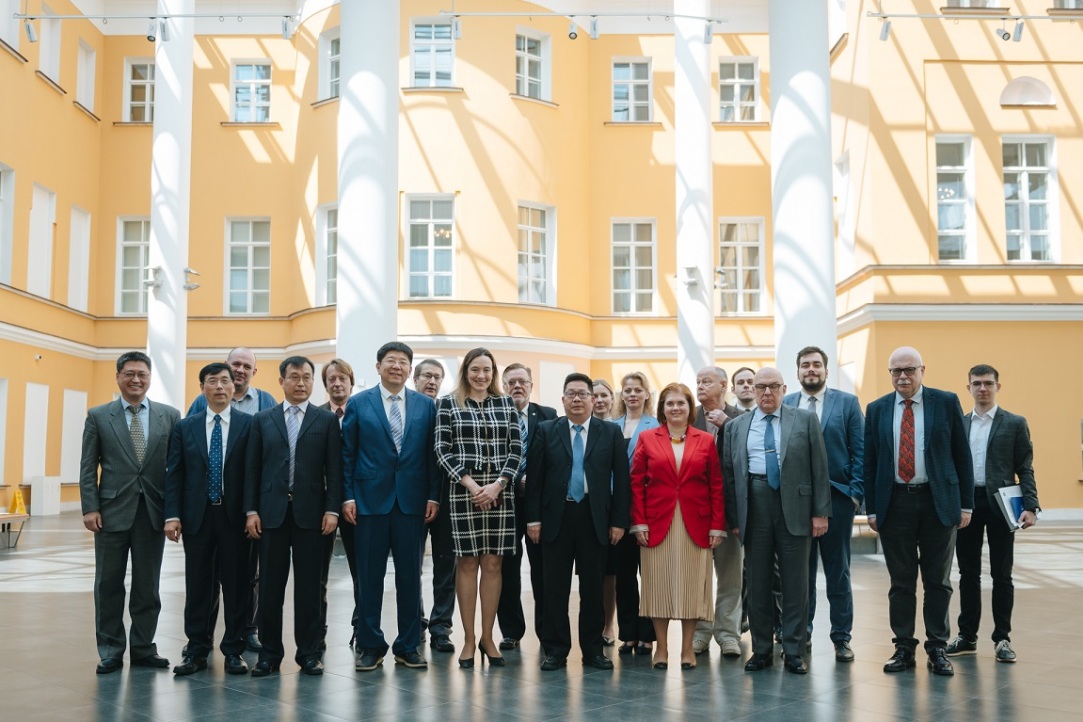‘The Russian-Chinese Partnership: A Stabilising Factor in the World’

A delegation from the Chinese Academy of Social Sciences (CASS) visited HSE University. As part of the visit, a roundtable discussion on ‘Russia and China: Comprehensive Partnership and Strategic Interaction in a New Era’ was held. Participants discussed issues related to the Russian-Chinese strategic interaction in global and regional security, finance, trade, and investment. The meeting was moderated by Victoria Panova, Vice Rector of HSE University, Head of the BRICS Expert Council–Russia, and Russia's Sherpa in the ‘Women's Twenty.’
‘This year we celebrate the 75th anniversary of the establishment of diplomatic relations between Russia and the People’s Republic of China. Russian President Vladimir Putin is currently on a state visit to China, the first visit after his inauguration. This is a significant sign for us, and in this context, our discussion takes on special significance. Moreover, today's roundtable is taking place during Russia's presidency in BRICS, where Russia and China play a special role,’ said Vice Rector of HSE University, Victoria Panova, in her opening remarks at the expert discussion.
Victoria Panova
She also expressed the commitment to sincere dialogue and emphasised that the aspects of the partnership between HSE University and CASS meet the national interests of both countries, serve as a stabilising factor for the entire world, and effectively promote the agenda of the global majority.
Timofey Bordachev, Academic Supervisor of the Centre for Comprehensive European and International Studies at HSE University, Head of the Section for BRICS National Strategies and Country Analysis of the BRICS Expert Council–Russia, outlined the prospects for cooperation between CASS and HSE University.
Timofey Bordachev
‘The topics we are discussing today will certainly become the focus of scientific projects and research. These issues can be divided into two groups: the first is topics of the current wartime and how Russia and China respond to Western pressure; the second is topics of peacetime, such as what the international order we aspire to will be like,’ the expert explained.
Sergey Avakyants
Sergey Avakyants, Director of the HSE Institute for Global Military Economics and Strategy, also shared his views on the prospects for the development of the partnership between Russia and China. ‘The strategic partnership between the two countries should go further and move towards the creation of joint scientific teams that will permanently engage in both practical developments and fundamental research in various fields,’ he believes.
The Chinese colleagues thanked the administration of HSE University for the warm welcome and acknowledged the high level of relations between the countries.
Zhang Guanzi, member of the Chinese People's Political Consultative Conference, Secretary General of the Board of Directors, National Top Think Tank, CASS, President and senior research fellow at the Institute of Academic Information Studies, CASS, noted that CASS considers HSE University a reliable and respected partner for long-term cooperation.
‘We highly value the professionalism and expertise of HSE University. Russian-Chinese relations are developing progressively, forming a coalition responsible for a new world order that should replace American global hegemony. Russia and China are the core of this coalition. The issues raised by Victoria Panova and Timofey Bordachev are of great interest to us,’ he said.

Wang Xiaoquan, Head of the Secretariat of the National Top Think Tank at CASS and Chief Research Fellow, added that both countries are actively participating in the reconstruction of the world economy. The Belt and Road Initiative and the Greater Eurasian Partnership are of great importance for the development of the continental economic zone. It is necessary to strengthen economic and humanitarian ties together and adapt to new conditions.
‘The trend towards multipolarity in the world is becoming increasingly evident: new world power centres are forming, many of which are located in the Eurasian space. Countries that can become centres of a multipolar world and lead the restructuring of global production chains must possess not only extensive economic resources but also strong comprehensive power, like Russia and China—the two largest world economies,’ Wang Xiaoquan believes. ‘Both countries are actively involved in the reconstruction of the world economy: China is making efforts to achieve high-quality development, and Russia is pursuing a policy of import substitution.’
Victoria Panova thanked the participants of the expert discussion for a productive dialogue and expressed confidence that the results of the discussion would make a valuable contribution to further cooperation between Russia and China and to the promotion of the agendas of both countries on the world stage.
